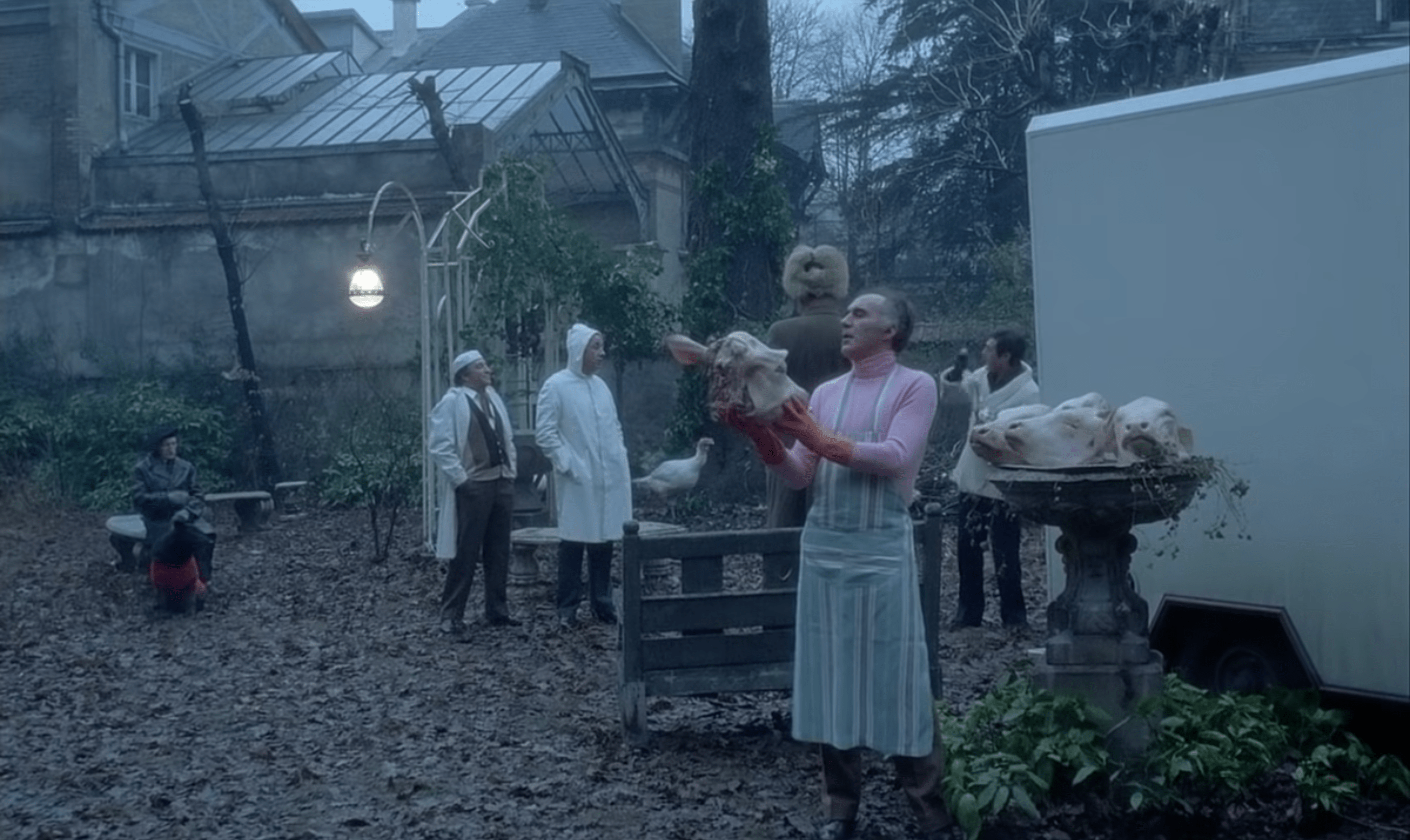Getting into arthouse movies can be a daunting proposition. Like most formally experimental artistic traditions, arthouse is freighted with connotations of difficulty and obscurity, intellectuality and dryness, capital-I Importance and capital-S Seriousness. The implication this sends to the uninitiated is that the arthouse movie is essentially a jigsaw puzzle that requires close readings of dialogue, meticulous mental note-taking of obliquely indicated symbolisms, and a master's degree in Freudian psychology to piece it all together, at which point the movie's secret metatextual message becomes manifest and you can be said to have Gotten It. Thankfully, this is not actually the case. And a movie like La Grande Bouffe, director Marco Ferreri's 1973 absurdist romp of gluttony and sex and really really long fart noises, is a great way to learn how to stop worrying and laugh without thinking too much.
The plot of La Grande Bouffe, which translates basically to The Great Feast, is simple: Four well-to-do middle-aged buddies hole themselves up in a luxurious Parisian villa to throw a lavish, never-ending feast during which they all plan to literally gorge themselves to death. This suicidally gluttonous plan of theirs goes unstated for about the first third of the movie, there is never any explanation of the what or why behind it, and at no point do the characters really wrestle with or reconsider their voluntary march to the grave. As Ferreri was fond of saying, La Grande Bouffe was his attempt at eschewing the psychological in favor of the physiological. And the physiological act of preparing and eating food—with its slaughtered and dismembered animals, gnashed hunks of flesh, bulging bellies and reverberantly expelled intestinal gasses, and coils and rivers of shit and piss and vomit—can make for a horrifying, hilarious, disgusting, pleasurable fodder for an arthouse movie.
It's tempting to read the plot as a commentary on societal consumerism, which on one level it indeed is. But focusing too much on the allegorical aspects runs the risk of misreading avant-garde art as primarily a vessel for the artist's message rather than an entertaining, engaging experience in its own right. La Grande Bouffe does pose interesting questions about runaway consumerism and bourgeois malaise and modern man's twisted psychological development, but what makes the movie good is the gorgeousness of its images and the expressiveness of its actors' faces and the hilariousness of its gags. And like all truly great experimental art, it's only because La Grande Bouffe works so well on the surface, visual, visceral, immediate level that its intellectual aspects can then come in to enrich the experience. To put that in terms of this movie: When a seething Marcello Mastroianni, raving at everyone and everything in misdirected rage about his inability to get an erection, kicks a toilet, and then that toilet erupts into a geyser of shit that sprays all over him and floods the bathroom, it is more important that you laugh at this than that you, like, get what it all really means, man.
The movie begins with four vignettes that introduce our four leading men as they say goodbye to their normal lives before heading off to the trip from which they do not plan to return. There is Ugo, played by Ugo Tognazzi, a Paris-based Italian chef and restaurateur; Michel, played by Michel Piccoli, an effeminate TV producer; Marcello, played by Marcello Mastroianni, a debonair Alitalia pilot and gearhead; and Philippe, played by Philippe Noiret, a rich, well-bred magistrate who lives with his childhood nanny/surrogate mother, Nicole, with whom he has an extremely perverse, codependent relationship. (A glimpse into the perversity: Before sending him off, a sobbing Nicole tries to plead Philippe into staying—she suspects he's going to a brothel—by pulling out his penis and jerking him off, telling him they should "Keep it in the family." Philippe meekly protests, his face a bizarre mix of shame, anxiety, and pleasure, but after staring at the buxom old woman's cleavage, his head starts to roll back and he gives in.)
From there, Philippe picks up his three friends and drives them to an unused property that belongs to his family, a home on Paris's Rue Boileau. The entire remainder of the story is contained on those palatial premises, and it is there where the movie's dominant motif—grotesque decadence—comes to the fore. Everything, from the home's extravagant decor to the people inside it to the events it hosts to the food consumed, is outrageously decadent. This makes for beautiful, rich images photographed with painterly care and composition by cinematographer Mario Vulpiani. The effect looks like what Rubens might paint if re-envisioning a Last Supper that replaced Jesus with the Antichrist.
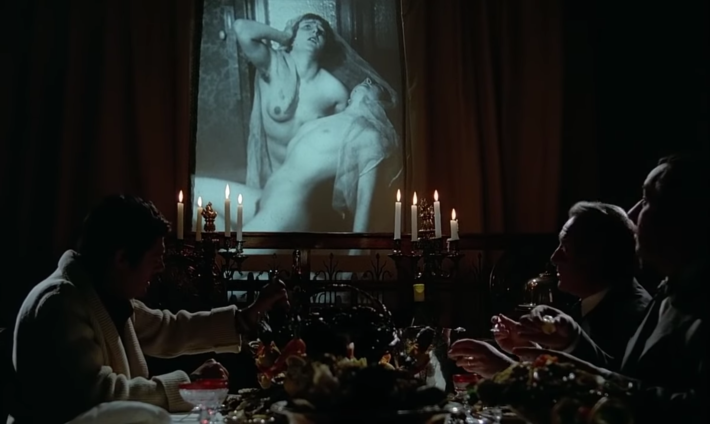
The most striking image comes early on. A butcher's van arrives the first evening to deliver enormous slabs of high-end meats. The butcher, wearing a large and furry ushanka while standing on a lawn chair, shouts out the food's farcically elaborate pedigrees—"Two deer with soft eyes and flesh imbued with the perfumes of the Couves forest! Ten dozen semi-wild guinea fowls fed on grain and juniper! Three innocent Ardennes cockerels!"—as his assistants haul the slabs inside. In a bird fountain next to the refrigerator van, several butchered cow heads rest. Michel, wearing a pink sweater and a grey apron and orange cleaning gloves, picks up one of the heads and begins to recite the opening lines from Hamlet's "To be or not to be" speech. Ugo, in a butcher frock himself, blows a raspberry. Marcello, with a maniacal intensity that is the character's main disposition during the movie, declares, "The festivities begin!" The camera returns to Michel, who warbles a wordless melody and begins a balletic dance with the cow head as his partner, eventually lifting it up and belting out the tune's high note, as the camera pushes in on the aloft head. It is absurd, a little discomforting, and totally beautiful.
Being a "physiological" movie, it's fitting that the acting is more physical than verbal or cerebral. With hardly a stitch of dialogue to explain the characters' inner motivations, it falls to the bodies and faces and gestures of the actors to communicate what lies beneath.
Take Marcello, for instance. Mastroianni plays Marcello with wild shifts in mood, from ferocious fervor, to uncontainable glee, to Tex Avery's Wolf-style hooting horniness all within seconds of each other. If, to certain characters in the movie, the allure of eating themselves to death was the romantic idea of dying in languorous repose, a final bite of pâté triggering an explosion of pleasure that causes the heart to burst, then Marcello is the opposite. The death he's shooting for is more dramatic and violent, his body one of his precious airplanes climbing into the sky and then nosediving straight toward the earth for an explosion of twisted metal and fire. It's no coincidence that it is he who demands the crew call for prostitutes early on, and that the hierarchy of his appetites goes from, in order of ascending importance, eating, fucking, and tinkering with the old Bugatti in the garage. It's also no coincidence that it is the breaking down of his own machine—his body, in the form of his impotence—that makes him abandon the plan, and that it is the breaking down of the repaired Bugatti that ultimately does him in.
On the other end of the spectrum is Philippe. Philippe, more than anyone else in the party (with the possible exception of Michel, whose obeisance to social decorum is so strict he can't even bring himself to fart in front of the others, which is the movie's funniest running gag), is beholden to bourgeois mannerliness and propriety. As host to such an important event, Philippe spares no expense to make it the finest dinner party possible, paying what must be extravagant prices for those soft-eyed deer and the well-fed guinea fowls and the innocent salt-meadow lambs from Mont Saint-Michel. He alone objects to Marcello's proposal to call in prostitutes, though they eventually arrive in spite of Philippe's protests. (Does he consider the feast too eminent a scene for hookers? Did Nicole's handjob oblige him to follow her orders?) And while he appears to be the richest and highest born of the bunch, Philippe is also the most diffident, the most childish, the least decisive, the least able to recognize and take ownership of his own desires. You get the sense that Philippe was always the kid with all the best toys, and the cool kids—in this case Marcello, Ugo, and Michel—befriended him more for what he had than who he was.
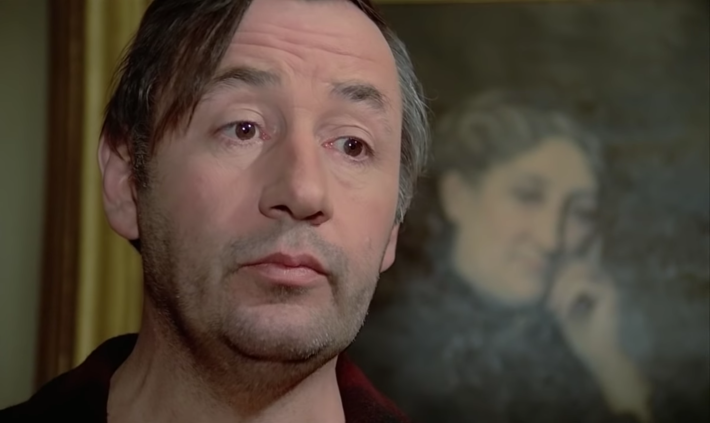
Philippe's underlying character is most clearly seen in his interactions with Nicole and, later, Andréa. Played by Andréa Ferréol, Andréa is a voluptuous and seemingly innocent school teacher who happens upon the gang in a chance meeting and eventually latches on as one of the party's key members. It eventually becomes clear that she is no virginal naif, and that her consumptive and libidinal appetites can equal and even surpass the men's. The most direct reference between Nicole and Andréa for Philippe is a scene between the latter two that mirrors Nicole's handjob earlier. Philippe is smitten by Andréa from the moment she arrives for dinner, though he's too bashful to do much about it. She too is charmed by him, and at one point offers to fix the button on his fly as a contrivance to get them alone together. While sewing his pants, Andréa opens Philippe's fly and puts her mouth on his penis. Once again Philippe's face twists up into a strange expression of neutrality and anxiety and pleasure, and after pausing for a minute to collect himself, he overcomes his repression and thrusts back toward her face so that she can continue. Mid-blowjob, he very formally asks for her hand in marriage. She says yes.
Andréa winds up playing a sort of angel of death role for the four gluttons, shepherding the men toward their grisly goal as they grow increasingly lethargic. (You could also liken her role to that of Mary's in Michelangelo's Pieta; the Pieta is referenced early on in the movie, and a somewhat similar statue of a woman supporting an ailing man stands in the villa's garden.) To accomplish this, she uses all aspects of her femininity, seamlessly transitioning between mother, maid, and seductress to the foursome. (It's remarkable the way Ferréol conveys those varied moods so convincingly with that incredibly expressive face of hers, her great big shining eyes beaming like headlights in wonder or lust or defiance during her several closeups. The camera loves to look at her looking at things.) She is a complete synthesis of the Madonna and the whore, which—to Philippe especially, seeing as his regular mother/maid/seductress figure is literally his maid and almost literally his mother—makes her the woman of their dreams.
Philippe remains devoted to Andréa throughout, even as her own sexual urges lead her to pursue all four of the housemates. He pretends his new fiancée's brazen infidelity doesn't bother him, but as he, Michel, and Ugo look on from the balcony while Marcello and Andréa are loudly rooting in the garden one morning, the smirks on Michel's and Ugo's faces and the frown on Philippe's tells a different story. Of all the characters' ends, Philippe's is the most pitiable. So tied up in peer pressure and maintaining appearances, he doesn't even consider running off with Andréa and living would could be a newly fulfilling life. Instead, he dutifully shovels spoonfuls of boob-shaped flan down his gullet, absent any pleasure or conviction, worried if he's letting his dead friends down by not having died yet.
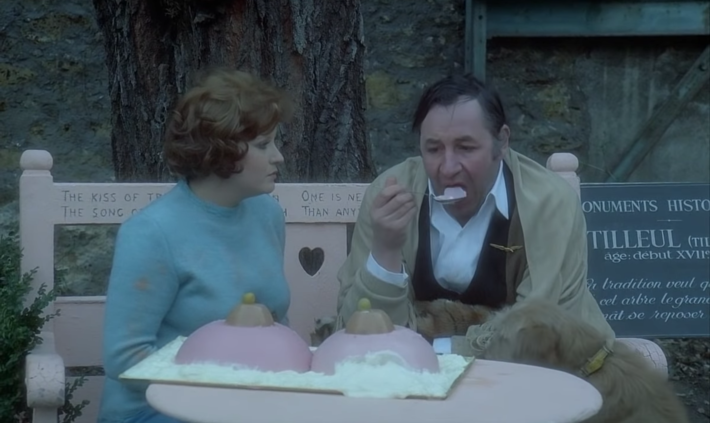
The difference between La Grande Bouffe and the kinds of shitty jigsaw puzzle arthouse movies is that La Grande Bouffe succeeds as a compelling work completely on its own narrative and aesthetic merits. Nothing laid out above requires any esoteric knowledge or symbolic parsing to appreciate. However, what makes Ferreri's movie something truly great is that it also does work on the intellectual level. It's not that the movie withholds its meaning as a secret, but instead thinking deeply about its themes makes an already rewarding experience even better. I loved the movie immediately after my first watch, and pursing the ideas it left me with led me to places like the Old Testament, the writing of 17th Century poet and art critic Nicolas Boileau, and a treatise on existentialism by Leo Tolstoy, among other things, which made the entire experience all the better.
The clearest hint to what La Grande Bouffe is on about comes about halfway through, during the big party when the prostitutes arrive. For a couple of scenes Michel keeps repeating "Vanity of vanities, vanitas vanitatum." This is a reference to the Old Testament's Book of Ecclesiastes. In Ecclesiastes, the narrator, an old king of Israel, recounts the story of his life. He has seen many things, traveled many places, studied from the wise and reverent and watched the foolish and indulgent. In the end, the narrator argues that none of it made any difference. Death comes for us all, the wise and foolish alike, and when dead and forgotten, a man's thoughts and deeds are irrelevant. The sun rises and falls, generations are born and die and are replaced by new ones that also die and are replaced, and the earth continues on with indifference. Wisdom is powerless to prevent man's ultimate fate, and God remains inscrutable to even the wisest. Thus, the affairs of men, their goals and passions and actions, are all just vanity. All one can really do in this life is enjoy life's simple pleasures while one can. In art, a work exploring these Ecclesiastic themes is called a vanitas.
Ecclesiastes is famously ambiguous. It's not clear whether its point is to justify religious skepticism and hedonistic nihilism, or if its message is something like "Life is short, so don't worry so much about things you can't control, tend your own garden, and enjoy what God has given you." In fact it's believed that its epilogue, which is more explicitly optimistic and God-fearing than the rest of the book, was added later by a separate author in order to temper the book's pessimism.
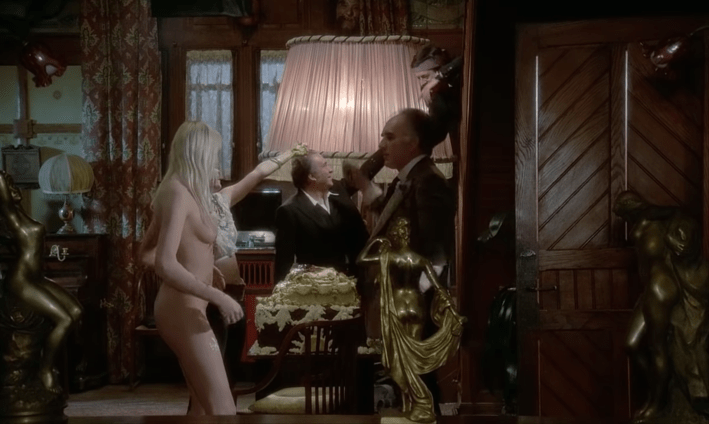
The parallels between Ecclesiastes and La Grande Bouffe are clear. Like the book's king, the movie's four main characters are wealthy and learned, and yet their lives are fundamentally empty. The more substantive of life's simple pleasures—the love of family, community, and religion—are almost completely absent. In place of God as a structuring force in their lives, there is only consumerism, which the movie investigates not through metaphor but by making the metaphor of consumerism literal. If life is meaningless, death inevitable, and the culture's dominant ideology built around unstinting consumption, then locking yourself at home surrounded by the finest things and consuming until you die is just taking those facts to their logical conclusion. For those unable to find meaning in a world of nothing but consumerism, the only way out is through.
Still, Ferreri's movie can't be summarized so neatly as offering a simple admonishment of or support for heedless consumption. The movie does take an overall dim view of that lifestyle; the characters are grotesque and ridiculous, there is little genuine pleasure in their journey, and their deaths are embarrassing and painful. However, there is genuine camaraderie and affection in the friendships, and none of the men are depicted as "bad." Maybe more to the point, there is no clear example of another, better path the men could've taken. Something about the world drove them to this choice, and the movie doesn't necessarily paint their making that choice as an individual moral failing on their parts. Like in Ecclesiastes, it's not exactly clear what if anything La Grande Bouffe wants you to take away from it morally.
The movie's ambiguity probably stems from Ferreri's own ambiguity. Though the movie is critical of the men, Ferreri himself must have identified closely with them. As recounted in a So Film article, Ferreri got the idea for the movie after a gluttonous evening very much like the ones depicted in La Grande Bouffe. The year before making the movie, Ferreri was down and out. His previous movie, Liza, was a flop, and his wife had left him. Without a home, Ferreri lived on the couch in Philippe and Alain Sarde's apartment. The three pals, combined with other friends like Tognazzi, would often throw lavish dinner parties. One night, Ferreri and company had a big blowout at a swanky Parisian eatery. Somehow not sated, the gang repaired back to the apartment Ferreri was couch surfing at. Tognazzi started cooking up some of his famous pasta. To spice things up, Ferreri called in some prostitutes. What came next was, well:
"What you imagine: pasta food sex, pasta food sex, sex food pasta, pasta food sex. Everyone went to a corner of the apartment to sleep or continue to fuck or eat," laughs Philippe Sarde at the microphone of France Culture. The next day, Eureka! Marco Ferreri has his new film.
Ferreri himself, then, had been in more or less the same position he put La Grande Bouffe's characters in. In that light, the movie's ambiguity makes more sense; Ferreri wanted to critique that lifestyle but the lifestyle was also his own. The real life Ferreri decided to investigate his feelings around how he was living through art, plunging himself deeper into it in his trademark satirical and absurdist way, to see what he found. Like the author of Ecclesiastes, Ferreri had lived a kingly life, and in La Grande Bouffe he testified to how none of it seemed to matter in the end. Still, Ferreri kept on going, confronting the existential through the creation of a work of art that asked big questions but also delighted in the simplest pleasures, like the laugh at a fart, and refused to tie it all together in a neat, moral bow. Through La Grande Bouffe, Ferreri seems to be saying that life might not have any grand cosmological meaning, but humans can try to make something beautiful from it, since art is about the closest thing to immortality we have. And that in life, the only way out is through.
